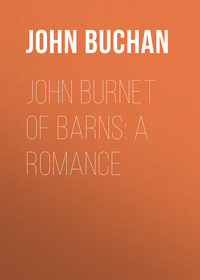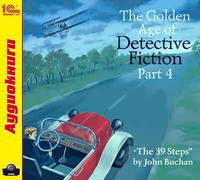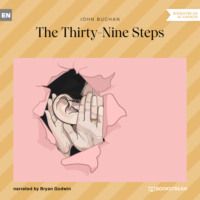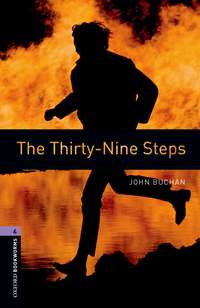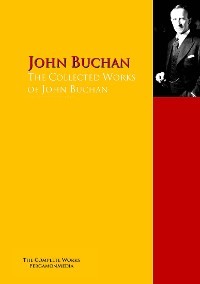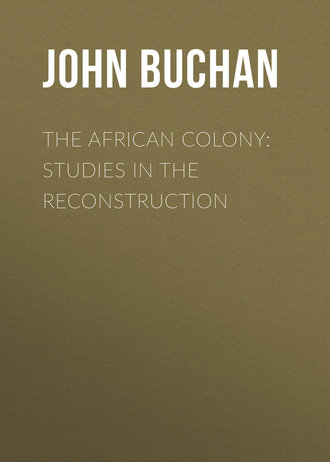 полная версия
полная версияThe African Colony: Studies in the Reconstruction
The high veld continues for some thirty miles north of the town before it sinks into bush and a humbler elevation. It is ordinary high veld – bleak, dusty, and in August a sombre grey; but on the east the blue lines, which are the Wood Bush and the Spelonken mountains, and in the far west the thin hills about the Magalakween valley, remind the traveller how near he is to the edge of the central plateau. Ten miles out a crest was reached, and we looked down on a long slope, with high mountains making gates in the distance, and a sharp little hill called Spitzkop set in the foreground. It was a cool hazy day, and in the west the kopjes seemed to swim in an illimitable sea of blue. The land is all part of Malietsie’s location, and patches of tillage and an occasional cluster of huts gave it a habitable air. The native girls wear thick rings of brass round their necks, which gives them a straight figure and a high carriage of the head, pleasant to see in a place where people slouch habitually. Malietsie’s is one of those Basuto tribes which are scattered over the North Transvaal – not the best type of native, for they are credulous and idle in their raw state, and when Christianised and dwelling near mission-stations, incorrigibly lazy and deceitful. They are also inordinately superstitious. I found that no one of my boys, who were mostly from Malietsie’s, would stir ten yards beyond the camp after dark. At first I thought the reason was dread of wild beasts, but I discovered afterwards that it was fear of spooks, particularly of one spook who rolled along the road in the shape of a ball of fire. It is a tribute to the greatness of the North Road that it should have a respectable ghost of its own. In a little we passed the last store, kept by an old Scotsman, who gave us much information about the district. He talked of the Road, the River, and the Mountain, without further designation, which is a pleasing habit of country folk, who give the generic name to the instances which dominate their daily life. The Limpopo was the River, the Zoutpansberg the Mountain, because no other river or mountain had a local importance comparable with these, just as to a Highland gillie his own particular ben is “the hill,” just as to Egypt the Nile is not the Nile but “the River.” He measured distance, too, by the Road: this place was so many miles down the road, that water-hole so many days’ journey up.
We inspanned again in the evening, and in a little turned the flanks of Spitzkop, and coming over a little rise saw a wide plain before us densely covered with dwarf trees. The long line of the Zoutpansberg comes to an abrupt end in a cliff above the Zoutpan. On the west the huge mass of the Blaauwberg also breaks off sharply in tiers of fine precipices. Between the two is a level, from fifteen to twenty miles wide, which is the pass from the high veld to the north. It is a broad gate, but the only one, for to the east the Zoutpansberg is impassable for a hundred miles, and on the west beyond the Blaauwberg the Magalakween valley is a long circuit and a difficult country. The great mountain walls were dim with twilight, but there was day enough left to see the immediate environs of the road. They had a comical suggestion of a dilapidated English park. The road was fine gravel, the trees in the half light looked often like gnarled oaks and beeches, and the coarse bush grass seemed like neglected turf. It is a resemblance which dogs one through the bush veld. You are always coming to the House and never arriving. At every turn you expect a lawn, a gleam of water, a grey wall; soon, surely, the edges will be clipped, the sand will cease, the dull green will give place to the tender green of watered grass. But the House remains to be found, though I have a fancy that it may exist on a spur of Ruwenzori. As it was, we had to put up with a tent and a dinner of curried korhaan, and during the better part of a very cold night some jackals performed a strenuous serenade.
The next morning dawned clear and very chilly, the mountains smoking with mist, and the dust behind our waggons rising to heaven in sharply outlined columns. However cold and comfortless the night, however badly the limbs ache from sleeping on hard ground, there is something in the tonic mornings which in an hour or so dispels every feeling but exhilaration. Water-holes have been made for the post-cart at lengthy intervals, but between there is nothing but rank bush, with flat trees like the vegetation in a child’s drawing produced by rubbing the pencil across the paper. Animal life was rich along the road – numerous small buck, a belated jackal or two, the graceful black-and-white birds which country people call “Kaffir queens,” korhaan, guinea-fowl, partridge, quantities of bush crows, and an endless variety of hawk and falcon. We left the Road and made a long detour over sandy tracks to visit the Zoutpan, from which the hills get their name, the most famous of Transvaal salt-pans. It is about three miles in circumference, and consisted at this season of caked grey mud, with little water-trenches and heaps of white salt on their banks. A wise law of the late Government forbade the alienation of salt-pans, but for some unknown reason a concession was given over this one, and instead of being the perquisite in winter of the arme Boeren it is managed by a Pietersburg syndicate, and as far as I could judge managed very well. The work is done by natives from the mountains who live round a little stream which flows from the berg to the pan, and forms the only fresh water for miles. The day became very hot, and the glare from the pan was blinding to unaccustomed eyes. As we returned to the main road, the noble mass of the Blaauwberg was before us, one of the finest and least known of South African mountains. That curious fiasco, the Malapoch war, was fought there, and Malapoch’s people still live in its corries. To a rock-climber it is a fascinating picture, with sheer rock walls streaked with fissures which a glass shows to be chimneys, and I longed to be able to spend a week exploring its precipices. To a mountaineer South Africa offers many attractions, for apart from what may be found in isolated ranges, there are some hundreds of miles of the Drakensberg with thousands of good climbs, and above all the great north-eastern buttress of Mont aux Sources, which to the best of my knowledge has never been conquered.
In the afternoon the country changed, the bush opened out, timber trees took the place of thorn, and long glades appeared of good winter pasture. There was a great abundance of game, and for the first time the paauw appeared, stalking about or slowly flapping across the grass. He is a fine bird to shoot with the rifle, but a hard fellow for a gun, for it is difficult to get within close range; and as a rule at anything over thirty yards he will carry all the shot you care to give him. This park-land lasts for about ten miles, and then at Brak River it ends and a dense thorn scrub begins, which extends almost without interruption to the Limpopo. There we found our relays of mules, and on a dusty patch near the mule-scherm we outspanned for the night. We were nearing the country of big game. A lion had been seen on the Bulawayo road the day before, a little north of the station; and it was a common enough thing to have them reconnoitring the scherm. As soon as darkness fell the cry of wolves began, that curious unearthly wail which is one of the eeriest of veld sounds. Most forcible reminder of all, a hunting party ahead of us had lost a man, who, after wandering for six days in the bush, while his companions gave him up for dead, had come out on the Road and been found by the man in charge of our relays. It was a miracle that he had not lost his reason or perished of thirst and fatigue, for he had neither food nor water with him, and only a little cloth cap to keep off the tropical sun. An old Boer from Louis Trichard, trekking with oxen, camped beside us; and after dining delicately off guinea-fowl I went over to his fire to talk to him. He was a typical back-veld Boer – a great hunter, friendly, without any sort of dignity, a true frontier man, to whom politics mean nothing and his next meal everything. He told me amazing lion stories, in which he always gave the coup de grâce, and displayed incredible courage and skill. He showed me with pride a ·400 express bullet which he kept wrapt up in paper – whether as a charm or a souvenir I do not know, for his own weapon was an ancient Martini. His one political prejudice concerned the Jews, whose character he outlined to me with great spirit. They were the opposite of everything implied in the term “oprecht”; but I am inclined to believe that, like many of us, he secretly believed that all foreigners were Jews, and in hugging the prejudice showed himself a nationalist at heart.
The coach-road runs due north to Tuli and Bulawayo, but the Road itself takes a slight bend to the east and follows the course of the mythical Brak River. For miles this stream does not exist – there is not even the slightest suggestion of a bed; and then appears a dirty hole full of greenish, brackish water, and we hail the resurrected river. It is necessary for the traveller to know where such holes lie, for they are the only water in the neighbourhood; and though the Road keeps close to them, there is nothing in the dense thorn bush which lines its sides to reveal the presence of water. I have never seen bleaker bush-land. All day long, through hanging clouds of dust, we crept through the featureless country, the Zoutpansberg and Blaauwberg behind us growing hourly fainter. For the information of travellers, I would say that the first water is at a place called Krokodilgat, the second at a place called Rietgaten, and that after that the Road bends northward away from the river, and there is no water till Taqui is reached. The dust of the track was thick with the spoor of wild cats, wolves, the blue wildebeest, and at rare intervals of wild ostrich. As night fell the bush became very dead and silent, save for the far-away howl of a jackal, – a dull olive-green ocean under a wonderful turquoise sky. We encamped after dark in a little wayside hollow, where we built a large fire and a massive scherm or enclosure of thorns for the animals. There was every chance of a lion, so I retired to rest with pleasant anticipations and a quantity of loaded firearms near my head. But no lion came, though about two o’clock in the morning the mules grew very restless, and a majestic figure (which was indeed no other than the present writer’s), armed with a ·400 express, might have been seen clambering about the top of the waggon and straining sleepy eyes into the bush.
We started at dawn next morning, as we had a long journey before water. The thorn bush disappeared and gave place to a more open country, full of a kind of wormwood which gave an aromatic flavour to the fresh morning air. Then came a new kind of bush, the mopani, a wholesome green little shrub, with butterfly-shaped foliage. The leaves of this tree would appear to be for the healing of the nations, for a decoction of them is regarded both as a preventive against and a cure for malaria; and a mopani poultice is a sovereign cure for bruises. Among the spoor on the track was that of a large lion going towards Taqui. There were also to our surprise the spoor and droppings of oxen. When about eleven o’clock we reached the large pits of whitey-blue brackish water which bear that name, we found the reason of both. A shooting party encamped there had had their cattle stampeded in the night, and early in the morning a Dutch hunter who accompanied them had gone out to look for them, and found an ox freshly killed by a lion not a quarter of a mile from the camp. He followed the lion, and wounded him with a long-range shot. When we arrived the search for the lion had begun, and he was found stone-dead a little way on, with his belly distended with ox-flesh and the bullet in his lungs. He was a very large lion, measuring about ten and a-half feet from tip to tip, rather old, and with broken porcupine-quills embedded in his skin. A trap-gun was set, and two nights later a very fine young black-maned lion, about the same size, was found dead a hundred yards from the trap, with a broken shoulder and a bullet in his spine. The remainder of the story shows the Providence which watches over foolish oxen. All were recovered save one, which died of red-water. They went straight back the road they had come; and though the country-side was infested with lions, wolves, and tiger-cats, they reached the mule-scherm at Brak River in safety.
From Taqui the road climbs a chain of kopjes where it is almost overarched with trees, so that a covered waggon has difficulty in getting through. From the summit there is a long prospect of flat bush country running to the Limpopo, with a bold ridge of hills on the Rhodesian side, and far to the east the faint line of mountains which is the continuation of the Zoutpansberg to the Portuguese border. The bush was dotted with huge baobabs, the cream-of-tartar trees which so impressed the voortrekkers in Lydenburg. At this season the branches were leafless, but a good deal of fruit remained, which our native boys eagerly gathered and munched for the rest of the journey. The fruit has a hard shell, and is filled with little white kernels like the sweetmeat called Turkish Delight. They have a faint sub-acid flavour, but otherwise are rather insipid. Their properties are highly salutary, and they are used to purify bad water and to keep the hunters’ blood clean in the absence of vegetable food. Their enormous trunks, often forty feet in circumference, are not wood but a sort of fibrous substance, so that a solid rifle bullet fired from short range will go through them. The baobab is indeed less a tree than a gigantic and salutary fungus; but in a distant prospect of landscape it has the scenic effect of large timber. An old Boer in the hunting party we had passed had given us an estimate of the distance to the next water; but, as it turned out, he was hopelessly wrong. It is nearly impossible to get a proper calculation of distance from country-people in South Africa. They are accustomed to calculate in hours, which of course vary in every district according to the nature of the road and the quality of the transport. Six miles an hour is the usual allowance; but when a Dutchman tries to calculate in miles he gets wildly out of his bearings. The hours method still sticks in their mind; and one man solemnly informed us that a certain place was six miles off for horses and ten for mules.
We outspanned for the night without water, and with the accompaniment of scherm and camp fires. Next morning we came suddenly out of the bush to a perfect English dell, where a little clear stream, the first running water we had seen, flowed out of a reed-bed into a rock pool. There were a few large trees and quantities of a kind of small palm. Under the doubtful shade of a baobab we breakfasted, and then went up the stream with our rifles to look for game. There was the usual superfluity of birds, but we saw no big game except a few bush-hogs. The stream ceased as suddenly as it began, and we followed up a dry sandy bed all but overgrown with a thorn thicket. A mile or so up we came on another pool, which was evidently the drinking-place of the bush, for the edges were trodden with the spoor of pig and monkey and a few large buck. Pig drink during the day, but the large game come to the water early in the morning or very late in the evening, and in the heat of mid-day go many miles into the bush. It was a hot business ploughing along in the deep sand, and I was very glad to return to the rock-pool and a bath on a cool slab of stone. It is a good bush-veld rule to follow the advice of Mr Jorrocks and sleep where you eat, and in the shade of the waggon we dozed till the cooler afternoon. The evening trek was in the old thorn-country, perfectly featureless, silent, and uninhabited. Since Malietsie’s location we had seen no Kaffirs except our own and the post-runners, and we were told that this whole tract of land is almost without natives. Even the water-holes, some of which are large and permanent, have failed to attract inhabitants. I am reminded of a story which has no application, but is worth recording. It was told to a burgher camp official by an old and deeply religious Boer, who was greatly pained at the experience. He fell asleep, he said, one night and dreamed; and, lo and behold, he was dead and at the gates of Paradise. An affable angel met him and conducted him to a place where people were playing games and laughing loudly, and were generally consumed with energy and high spirits. “This,” said his guide, “is the Rooinek heaven.” “No place for me,” said the dreamer; “these folk do not keep the Sabbath, and their noise wearies me.” Then he came to another place where there was much beer and tobacco, and roysterers were swilling from long mugs and smoking deep-bowled pipes to the strains of a brass band. “Again this intolerable row,” said my friend, “though the tobacco looks good – clearly the German paradise.” The next place they came to was a town where thin-faced men were running about buying and selling and screeching market quotations. My friend would not at first believe that this was Paradise at all, but his informant said it was the corner reserved for virtuous Americans. “Take me as soon as possible to the paradise of my own folk,” said the dreamer; “I am tired of these uitlander heavens.” And then it seemed to him he was taken to a very beautiful country place, with rich green veld, seamed with water-furrows, and huge orchards of peaches and nartjes, and pleasant little houses with broad stoeps. The soul of my friend was ravished at the sight. Clearly, he thought, the Boers are God’s chosen folk, and he was about to select his farm when a thought struck him. “But where are all our people?” he asked. “Alas!” said the affable angel, dropping a tear, “it pains me to tell you that they are all in the Other Place.”
Our evening outspan was below the kopjes where the copper mines lie, and a few tracks in the veld and an empty tin or two gave warning of human habitation. These copper mines, which are about to be thoroughly exploited by Johannesburg companies, are old Kaffir workings, and, possibly, from some of the remains, Phœnician. The scenery suddenly became very peculiar, – English park-land, but with a tint of green which I have never seen before, a kind of dull metallic shade like some mineral dye. There were avenues of tolerably high trees, and a sort of natural hedgerow. The grass was short and rich, and but for the odd hue not unlike a home meadow. There were also a number of wood-pigeons of the same metallic green, so that the whole place was a symphony in a not very pleasing colour. Early next morning, leaving our transport behind, we set off for the Limpopo, which is about eight miles off. The thorn thickets appeared again, and the heat as we descended into the valley became oppressive. The altitude of the river is about 1500 feet, which is a descent of nearly 3000 feet from the high veld, and even in winter time the heat is considerable, for the soil is a fine sand, and no breeze penetrates to the wooded valley. I had seen the Limpopo a wild torrent in the passes of the Magaliesberg, and I had seen it a broad navigable river at its mouth; so I was scarcely prepared for the bed of dazzling white sand which here represented the stream. Main Drift is about a quarter of a mile wide, with a bed of bulrushes in the centre, and except for a thin trickle close to the Rhodesian shore it is as dry as the Egyptian desert. But twelve miles higher up it is a full stream with rapids and falls, crocodile and hippo, and some miles down it is a stagnant tropical lagoon. The water is there, but buried below Heaven knows how many feet of rock and sand. Those mysterious African rivers which disappear and return after many miles have a fascination for the mind which cares for the inexplicable. The valley is there, the bulrushes, the shingle, the water-birds, but no river – only a ribbon of white sand, or a few dusty holes in the rock. And then without warning, as the traveller stumbles down the valley, water rises before him like a mirage, and instead of a desert he has a river-side. There is little kinship between the torrent which rushes through Crocodile Poort and this arid hollow, but the great river never loses itself, and though it is foiled and swamped and strained through sand it succeeds in the end, like Oxus in the poem, in collecting all its waters, and pours a stately flood through the low coast-lands to the ocean. Ploughing about in the dry bed under the tropical noontide sun was dreary work, and put us very much in the position of Mr Pliable in the Slough of Despond, when he cried, “May I get out again with my life, you shall possess the brave country alone for me.” We saw a number of spur-winged geese, which for some reason the Boers call wild Muscovy, and a heron or two sailing down the blue. A little up stream there was a lagoon in the sand flanked on one side by rocks – a clear deep pool, where a man might bathe without fear of strange beasts. Wallowing in the lukewarm water, the glare exceeded anything I have known – blue water, white rock, and acres and acres of white sand between hot copper-coloured hills.
As we left the river we said farewell to the Road. It showed itself on the Rhodesian side climbing a knoll past a cluster of huts which had once been a police station, but had been relinquished because of the great mortality from fever. Thereafter it was lost among bush and a chain of broken hills. It cared nothing for appearances, being sandy and overgrown and in places scarcely a track at all, for it had a weary way to go before it could be called a civilised road again. There was something purposeful and gallant in the little trail plunging into the wilds, and with regret we took our last look of it and turned our faces southwards.
Our way back lay mostly through dense bush-land, and in the days of hunting and the evenings round the fire I saw much of the life and realised something of the fascination of this strange form of country. It has no obvious picturesqueness, this interminable desert of thorn and sand and rank grass, varied at rare intervals by a raw kopje or a clump of timber. The sun beats on it at mid-day with pitiless force, and if it was hot in the month of August, what must it be at midsummer? The rivers are sand-filled ditches, and the infrequent water is found commonly in brack lagoons; but, dry as it is, it has none of the wholesomeness of most arid countries, generally forming a hotbed of fever. An aneroid which I carried to give a flavour of science to our expedition, put its average elevation at between 1500 and 2000 feet. Agriculture is everywhere impossible, though some of the better timbered parts might make good winter ranching country. But, apart from possible mineral exploitation, the land must remain hunting veld, and indeed is favourably placed for a large-game preserve. The very scarcity of water makes it a suitable dwelling-place for the larger buck, who drink but once a-day; and the difficulty of penetrating such a desert will be an effective agent in preservation. A man walking through it sees nothing for days beyond the dead green of thorn bush, till he comes to some slight ridge and overlooks a round horizon, a plain flat as mid-ocean, crisped with the same monotonous dwarf trees. Hidden away round water-holes there are glades and drives with a faint hint of that softness which to us is inseparable from woodland scenery, but they are so few that they only increase by contrast the sense of hard desolation. The bush is very silent. Its dwellers make no noise as they move about, till evening brings the cries of beasts of prey. The nights in winter are intensely cold, with a sharpness which I found more difficult to endure than the honest frost of the high veld. The noons are dusty and torrid, and the thirst of the bush is a thing not easily coped with. But in three phases this desert took on a curious charm. That South African landscape must be bleak indeed which is not transformed by the mornings and evenings. For two hours after sunrise a chill hangs in the air, light fresh winds blow from nowhere, and the scrub which is so dead and ugly at mid-day assumes clear colours and stands out olive-green and rich umber against the pale sky. At twilight the wonderful amethyst haze turns everything to fairyland, the track shimmers among purple shadows, and every little gap in the bush is magnified to a glade in a forest. I have also a very vivid memory of a view from one of the small ridges in full moonlight. It was like looking from a hill-top on a vast virgin forest, a dark symmetrical ocean of tree-tops with a glimpse of ivory from an open space where the road emerged for a moment from the covert.


